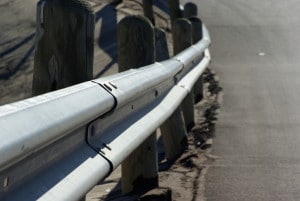A whistleblower lawsuit has accused Trinity Industries of defrauding the U.S. government by allegedly failing to inform the Federal Highway Administration of a change it made in 2005 to a rail head on the ET-Plus guardrail that could potentially increase the risk of injury or death for motorists in accidents involving the guardrail.
Why Trinity Guardrail Lawsuits in

Arkansas?
A previous version of the Trinity ET-Plus guardrails featured a metal component in the railhead that was five inches in length. According to reports, Trinity altered this component, shortening it to four inches in the ET-Plus design. While this change may not seem drastic, experts report that such a small decrease in length could increase the risk of injury or death.
The guardrail is intended to fold on impact, absorbing the shock of the crash. However, ET-Plus guardrails, the smaller railheads can cause the end terminal to fall off, potentially causing the guardrail to penetrate a car that collides with it. Should this occur, motorists and their passengers could become seriously injured or killed.
According to recent media reports, Virginia state officials have announced that they will not wait for additional details to be released from the FHA or other investigating agencies. Instead, it will be the first state to remove the guardrails from its highways, and 30 other states have followed suit and issued regulations to ban the use of Trinity guardrails on the roads.
Injuries and Deaths Linked to Trinity Guardrails
Issues with the ET-Plus guardrails were reportedly discovered during the investigation of a crash site involving the ET-Plus guardrail near mile marker 153 on Interstate 40 in North Little Rock. According to an article published by the New York Times, the ET-Plus System has been linked to several injuries as well as at least five deaths in 14 separate incidents in the U.S. The Trinity whistleblower lawsuit alleges that there are seven other guardrail models in the U.S. with different end terminals and different crash continuators, and none of these are connected to deaths in the same manner as the newly-modified ET-Plus System.
Following the emergence of a potential problem, The Safety Institute conducted a study that examined data from accidents that occurred in both Missouri and Ohio from 2005-2014 and 2005-2013, respectively. Researchers verified that contact with a guardrail had been identified as the “most harmful event” in each of the accidents they analyzed.
The results suggested that the ET-Plus carried the highest likelihood of death or injury from among the guardrails analyzed. According to the data, when researchers compared the previous model to the modified product, the latter was 1.36 times more likely to cause severe, life-threatening injuries and 2.86 times more likely to cause a fatality.
Those who have been injured or lost a loved one are urged to seek legal counsel to learn whether they are eligible to file a Trinity guardrail lawsuit in Arkansas to seek compensation for their injuries.
Are There Lawsuits Pending in the U.S.?
A whistleblower lawsuit accused Trinity of failing to tell the FHA of the design changes that the company made to its railhead in 2005. As a result, the government reportedly purchased the product not knowing of the possibility of an increased risk of death or injury related to the change.
In October 2014, the jury in the whistleblower lawsuit found that Trinity defrauded the government and ordered the company to pay $175 million. The verdict, reached in the U.S. District Court, Eastern District of Texas, could triple to $525 million under the Federal False Claims Act.
Can You File an Arkansas Trinity Guardrail Lawsuit?
If you believe that you or someone you love has been injured or killed by a Trinity guardrail, you could be eligible to file an Arkansas Trinity guardrail lawsuit and recover damages for your injuries. Contact Attorney Group for Arkansas to receive a free case evaluation. There are no out-of-pocket expenses to speak with us, and we can connect you with an affiliated attorney who can file an Arkansas Trinity guardrail lawsuit on your behalf.





